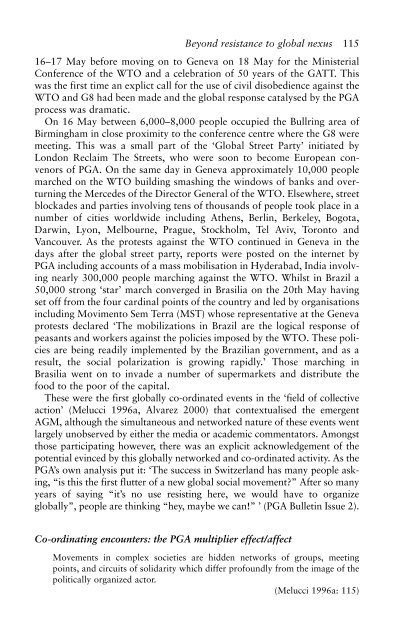Complexity and Social Movements: Multitudes at the Edge of Chaos ...
Complexity and Social Movements: Multitudes at the Edge of Chaos ...
Complexity and Social Movements: Multitudes at the Edge of Chaos ...
You also want an ePaper? Increase the reach of your titles
YUMPU automatically turns print PDFs into web optimized ePapers that Google loves.
Beyond resistance to global nexus 115<br />
16–17 May before moving on to Geneva on 18 May for <strong>the</strong> Ministerial<br />
Conference <strong>of</strong> <strong>the</strong> WTO <strong>and</strong> a celebr<strong>at</strong>ion <strong>of</strong> 50 years <strong>of</strong> <strong>the</strong> GATT. This<br />
was <strong>the</strong> first time an explict call for <strong>the</strong> use <strong>of</strong> civil disobedience against <strong>the</strong><br />
WTO <strong>and</strong> G8 had been made <strong>and</strong> <strong>the</strong> global response c<strong>at</strong>alysed by <strong>the</strong> PGA<br />
process was dram<strong>at</strong>ic.<br />
On 16 May between 6,000–8,000 people occupied <strong>the</strong> Bullring area <strong>of</strong><br />
Birmingham in close proximity to <strong>the</strong> conference centre where <strong>the</strong> G8 were<br />
meeting. This was a small part <strong>of</strong> <strong>the</strong> ‘Global Street Party’ initi<strong>at</strong>ed by<br />
London Reclaim The Streets, who were soon to become European convenors<br />
<strong>of</strong> PGA. On <strong>the</strong> same day in Geneva approxim<strong>at</strong>ely 10,000 people<br />
marched on <strong>the</strong> WTO building smashing <strong>the</strong> windows <strong>of</strong> banks <strong>and</strong> overturning<br />
<strong>the</strong> Mercedes <strong>of</strong> <strong>the</strong> Director General <strong>of</strong> <strong>the</strong> WTO. Elsewhere, street<br />
blockades <strong>and</strong> parties involving tens <strong>of</strong> thous<strong>and</strong>s <strong>of</strong> people took place in a<br />
number <strong>of</strong> cities worldwide including A<strong>the</strong>ns, Berlin, Berkeley, Bogota,<br />
Darwin, Lyon, Melbourne, Prague, Stockholm, Tel Aviv, Toronto <strong>and</strong><br />
Vancouver. As <strong>the</strong> protests against <strong>the</strong> WTO continued in Geneva in <strong>the</strong><br />
days after <strong>the</strong> global street party, reports were posted on <strong>the</strong> internet by<br />
PGA including accounts <strong>of</strong> a mass mobilis<strong>at</strong>ion in Hyderabad, India involving<br />
nearly 300,000 people marching against <strong>the</strong> WTO. Whilst in Brazil a<br />
50,000 strong ‘star’ march converged in Brasilia on <strong>the</strong> 20th May having<br />
set <strong>of</strong>f from <strong>the</strong> four cardinal points <strong>of</strong> <strong>the</strong> country <strong>and</strong> led by organis<strong>at</strong>ions<br />
including Movimento Sem Terra (MST) whose represent<strong>at</strong>ive <strong>at</strong> <strong>the</strong> Geneva<br />
protests declared ‘The mobiliz<strong>at</strong>ions in Brazil are <strong>the</strong> logical response <strong>of</strong><br />
peasants <strong>and</strong> workers against <strong>the</strong> policies imposed by <strong>the</strong> WTO. These policies<br />
are being readily implemented by <strong>the</strong> Brazilian government, <strong>and</strong> as a<br />
result, <strong>the</strong> social polariz<strong>at</strong>ion is growing rapidly.’ Those marching in<br />
Brasilia went on to invade a number <strong>of</strong> supermarkets <strong>and</strong> distribute <strong>the</strong><br />
food to <strong>the</strong> poor <strong>of</strong> <strong>the</strong> capital.<br />
These were <strong>the</strong> first globally co-ordin<strong>at</strong>ed events in <strong>the</strong> ‘field <strong>of</strong> collective<br />
action’ (Melucci 1996a, Alvarez 2000) th<strong>at</strong> contextualised <strong>the</strong> emergent<br />
AGM, although <strong>the</strong> simultaneous <strong>and</strong> networked n<strong>at</strong>ure <strong>of</strong> <strong>the</strong>se events went<br />
largely unobserved by ei<strong>the</strong>r <strong>the</strong> media or academic comment<strong>at</strong>ors. Amongst<br />
those particip<strong>at</strong>ing however, <strong>the</strong>re was an explicit acknowledgement <strong>of</strong> <strong>the</strong><br />
potential evinced by this globally networked <strong>and</strong> co-ordin<strong>at</strong>ed activity. As <strong>the</strong><br />
PGA’s own analysis put it: ‘The success in Switzerl<strong>and</strong> has many people asking,<br />
“is this <strong>the</strong> first flutter <strong>of</strong> a new global social movement?” After so many<br />
years <strong>of</strong> saying “it’s no use resisting here, we would have to organize<br />
globally”, people are thinking “hey, maybe we can!” ’ (PGA Bulletin Issue 2).<br />
Co-ordin<strong>at</strong>ing encounters: <strong>the</strong> PGA multiplier effect/affect<br />
<strong>Movements</strong> in complex societies are hidden networks <strong>of</strong> groups, meeting<br />
points, <strong>and</strong> circuits <strong>of</strong> solidarity which differ pr<strong>of</strong>oundly from <strong>the</strong> image <strong>of</strong> <strong>the</strong><br />
politically organized actor.<br />
(Melucci 1996a: 115)




